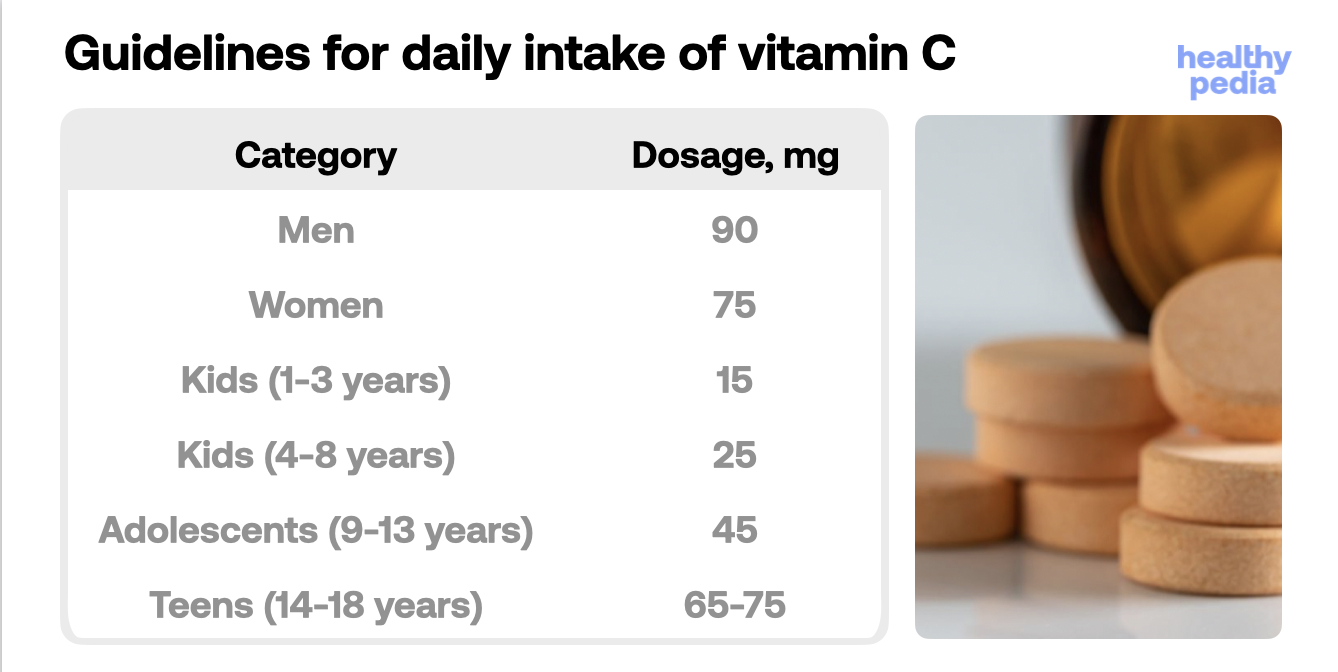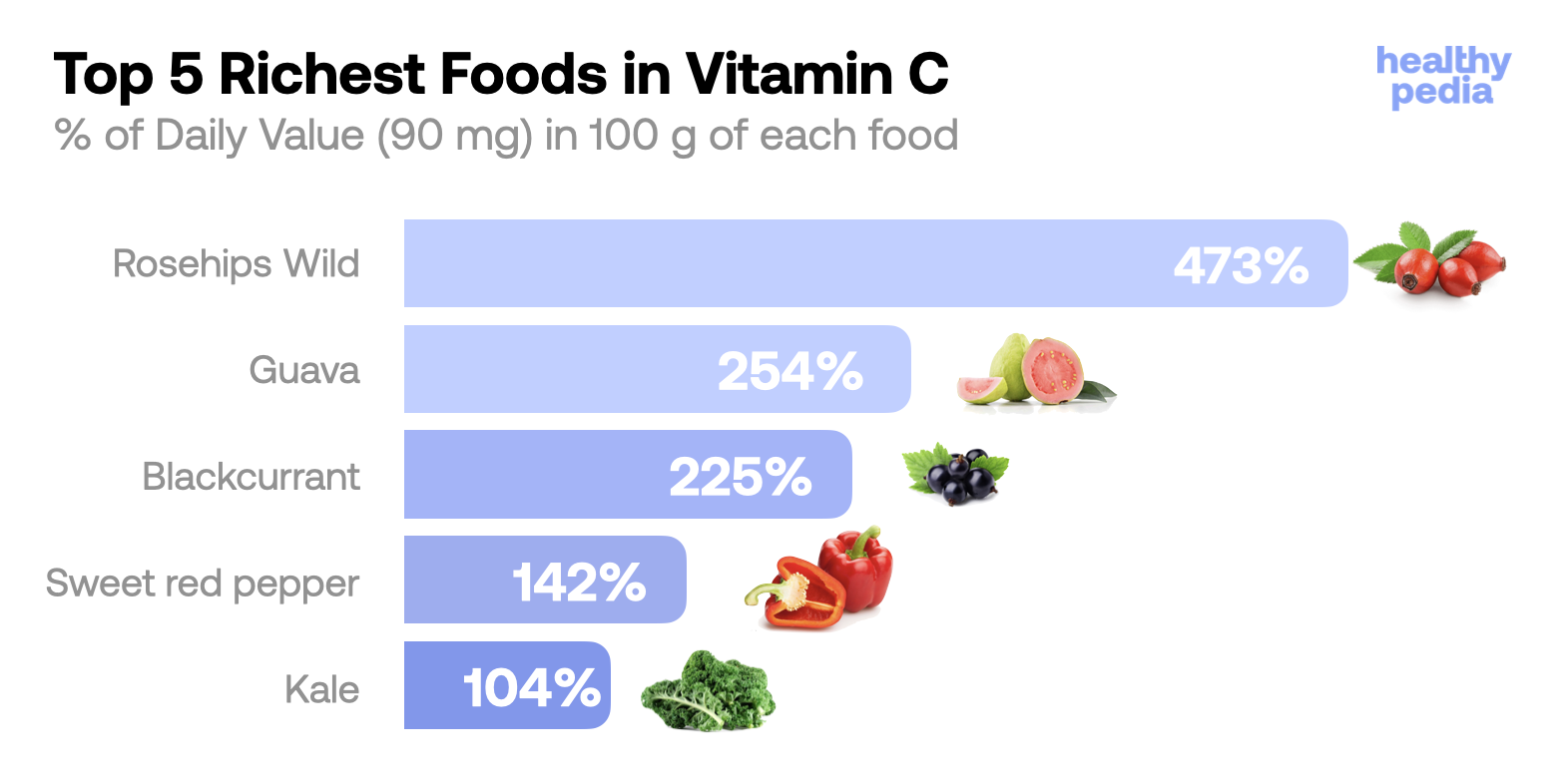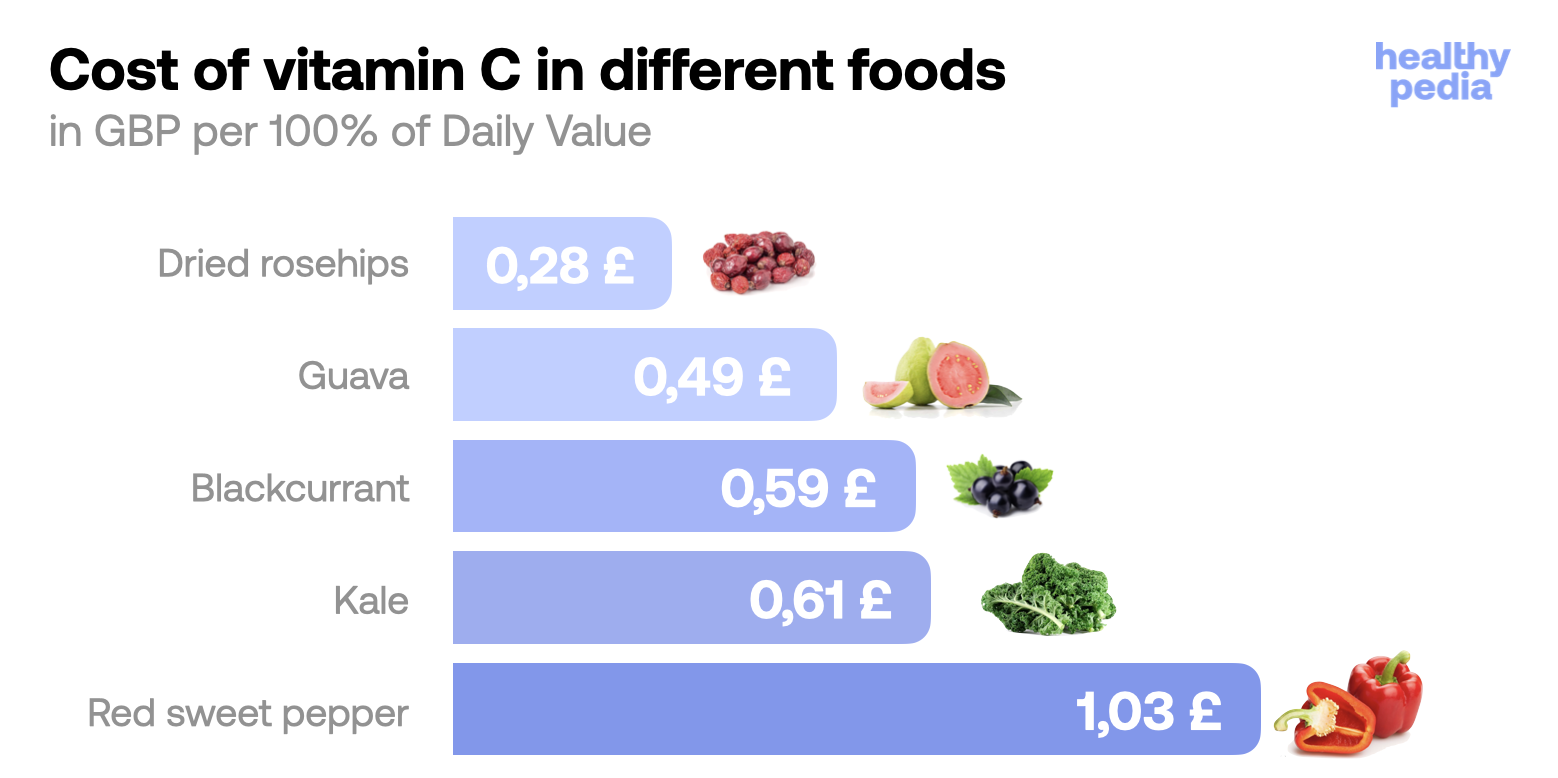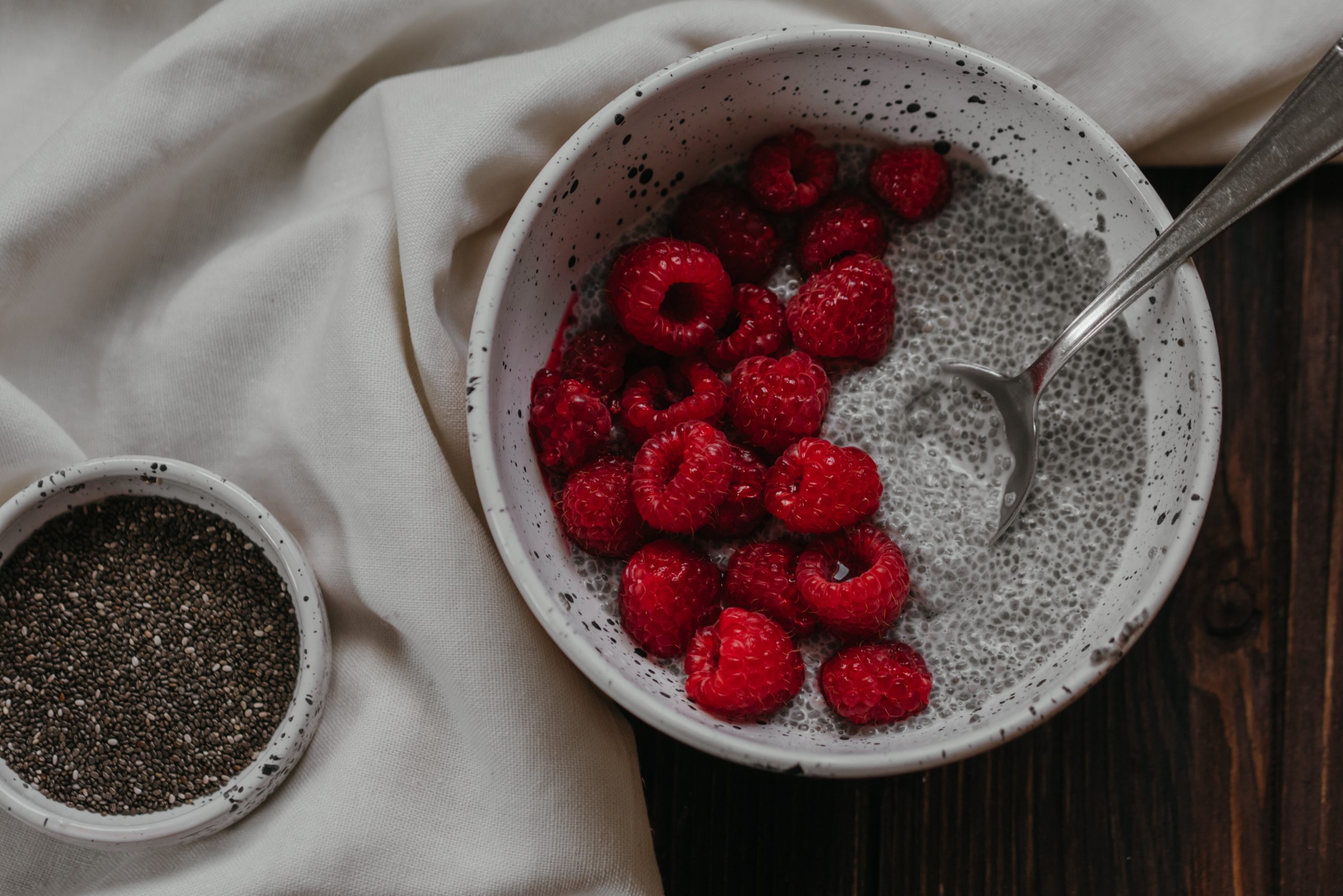Vitamin C is an important biologically active substance that supports a number of essential processes in the human body. In today’s world, when it comes to nutrition, people are concerned about eating more protein, one of the functions of which is to build nice, strong muscles. But have you considered that a critically low vitamin C level is comparable to death?
Interesting fact that humans, unlike most other mammals, are not capable of producing vitamin C within the body. Mammals are able to synthesise vitamin C from glucose, but humans lack the enzyme L-gulonolactone oxidase, which is required for this synthesis. The loss of this enzyme is thought to be due to a genetic mutation that occurred years ago. And as a result, humans must obtain vitamin C from their diet or from supplements.
Key functions – good stuff

Vitamin C is an essential vitamin, meaning your body can’t produce it. Yet, it has many roles and has been linked to impressive health benefits if you consume it enough.
1Supports the immune system
Our immune system is responsible for keeping us healthy, and the stronger it is, the better. Everyone’s immune system needs vitamin C to function properly, so top it up! Researchers from the University of Helsinki found that taking a vitamin C supplement could reduce the rate of colds in active people by 50%.
 Source: University of Helsinki
Source: University of Helsinki Being in our bodies Vitamin C promotes the production of white blood cells known as lymphocytes and phagocytes, which help protect the body from infection. Vitamin C helps these white blood cells function more effectively while protecting them from damage by potentially harmful molecules such as free radicals.
2Promotes healthy blood pressure levels
Scientific research has also linked sufficient vitamin C to healthy blood pressure levels. A large and robust meta-analysis of 29 clinical trials, showed that for about eight weeks, people who regularly took vitamin C supplements had a useful reduction in systolic (−3.84 mm Hg) and diastolic blood pressure (−1.48 mm Hg).
3Helps maintain bone and cartilage
Vitamin C plays an important role in maintaining the strength of cartilage and bones by helping our bodies produce collagen. Collagen is the most common protein in our body and serves as the basis for structure and strength.

4Plays a role in improving brain function
Vitamin C plays a role in neurotransmitter synthesis and cognitive function. Neurotransmitters are important for sending messages from the brain to the rest of the body. Vitamin C may be associated with increased brain function.
Researchers found that participants with cognitively intact abilities had higher levels of vitamin C than those with impaired cognitive abilities, according to a systematic review published in Nutrients in September 2017.
5Improves iron absorption in the intestines
Sometimes nutrients become buddies and help each other. This is the case with vitamin C and the essential mineral iron. Vitamin C supports the solubility of iron in the small intestine, allowing more iron to be absorbed in the intestine. Iron is one of the essential minerals we need every day for DNA synthesis, immune function, and healthy red blood cells to deliver oxygen throughout the body. And these are just a few of the main things this mineral can do. Virtually every cell in your body needs iron to function properly, which gives those who struggle to get enough iron another reason to increase their daily intake of vitamin C.
6Supports adrenal function and hormonal balance
The role of vitamin C in neuroendocrine pathways starts in the brain but trickles down throughout the entire body to help balance hormones. In fact, the adrenal glands contain the highest concentration of vitamin C in the whole body and are essential for the proper production of cortisol.
7Energy production booster
Vitamin C is involved in energy metabolism and helps reduce fatigue and tiredness. It is a vital nutrient for our adrenal glands. Also, due to its role in reducing oxidative stress caused by overexertion and exposure to toxins, vitamin C helps reduce the body’s overall stress and energy needs.
8Protects your cells from damage
Vitamin C is a powerful antioxidant that can help protect cells from damage caused by free radicals, which are unstable molecules produced by metabolic processes in the body or from external factors such as pollution or radiation. Free radicals can cause oxidative stress, which can damage cells, proteins, and DNA.
Vitamin C can also regenerate vitamin E, another important antioxidant, when it becomes oxidized. Doing so helps to maintain the antioxidant defenses of the body and prevent oxidative damage.
9Has a pigment-eliminating effect
For many women, pigmentation on the skin, particularly on the face, is increasingly becoming a popular problem. And this, in turn, is being actively exploited by cosmetic manufacturers. This is why all cosmetic manufacturers love vitamin C for its ability to reduce pigmentation on the skin and make it even and clear. Every girl wants a treatment where two or three products solve her pigmentation problems quickly and easily. Generally, skin care products containing vitamin C are labeled as ‘brightening’.
Specific features

There are two types of vitamins: fat-soluble and water-soluble.
Vitamin C refers to water-soluble vitamins. Water-soluble vitamins are not stored in the body and any excess is excreted in the urine.
It is important to get your vitamin C from a varied diet that will provide your body with a steady supply of vitamin C. However, certain medical conditions and medications can affect vitamin and mineral absorption, and in those cases, supplements may be necessary. Always discuss this with your doctor.
Bad news if there is a deficiency

If you suffer from a combination of the following symptoms, you may be vitamin C deficient:
-
Bruising easily
-
Bleeding gums
-
Not healing quickly
-
Dry and splitting hair
-
Depression
-
Fatigue
If you or a member of your family are experiencing these symptoms, you should consult a healthcare professional for proper advice and treatment. If untreated, it can cause a multitude of health problems.
One of the serious problems of severe vitamin C deficiency can be scurvy. Vitamin C is essential for the synthesis of collagen, a protein that is a crucial component of connective tissues throughout the body. When there is not enough vitamin C in the body, collagen production is impaired, leading to a breakdown of tissues and a range of symptoms. The main cause of scurvy is a lack of a healthy and balanced diet.
Scurvy is a very unpleasant and serious disease. Back in 1739, a researcher found a cure for this terrible disease. His name was James Lind, a doctor in the British navy. Lind believed that scurvy was caused by putrefactive tissue and that acids could help, so he put an acidic substance in the food of sailors who suffered from scurvy. This method has shown great results! The sailors were able to recover quite quickly. Later in 1753, he published ‘Treatise on Scurvy’ in which, on the basis of his research, he outlined all he knew about the disease from other authors, described his experiments, his method of prevention and treatment based on them, and his own reasoning about the causes of the disease. Sadly, Lind’s ideas were not welcomed because they contradicted the beliefs of influential high-ranking doctors. As a result, during the wars that soon followed, more British sailors died from scurvy than from warfare.
Bad news if over-consumed or overloaded
Even in high doses, vitamin C is not toxic and does not cause serious side effects. The most common side effects are diarrhoea, nausea, abdominal cramps and other gastrointestinal disorders. In general, these side effects do not occur as a result of eating foods that contain vitamin C.
They appear only as a result of taking high doses of vitamin C supplements. You are most likely to experience digestive symptoms if you consume more than 2,000 milligrams (mg) at once. Thus, a Tolerable Upper Intake Level (UL) of 2,000 mg per day has been established. If you are experiencing digestive problems as a result of taking too much vitamin C, you can simply reduce the dose of supplementation or stop taking vitamin C altogether.
Note from Healthypedia
The Tolerable Upper Intake Level (UL) is a nutrient intake value that is established by the Institute of Medicine (IOM) of the National Academy of Science. The UL is defined as the highest average daily nutrient intake level that is likely to pose no risk of adverse effects to almost all individuals in the general population.
How much vitamin C do we need? Norms and recommendations

We all need to understand how much vitamin C we need per day, the Food and Nutrition Board of the National Academy of Sciences, Engineering, and Medicine in the USA has developed guidelines for the human daily intake of this vitamin.
 Source: National Academies
Source: National Academies Best ways to get vitamin C

The best way to get vitamin C is through a varied and balanced diet, which includes a range of foods high in vitamin C. Fruits and vegetables are particularly good sources of vitamin C.
 Source: USDA
Source: USDA The mere presence of vitamin C in these products is reasoned enough for you to always have a varied diet. All of these foods you can easily include in your diet.
Most cost-efficient ways
 Source: Healthypedia
Source: Healthypedia Supplementation
Whole foods contain a variety of nutrients that work together in a balanced way to support overall health. On the other hand, supplements often contain isolated and highly concentrated doses of certain nutrients, which can imbalance nutrients in the body and lead to imbalances and negative health effects.
Food contains a number of beneficial compounds such as fibre, antioxidants and phytochemicals that are not normally found in supplements. These compounds can help regulate the absorption and utilization of nutrients in the body and provide additional health benefits.
And importantly overdosing on certain nutrients can lead to toxicity, which is more likely to occur with supplements than with whole foods. This is because the nutrients in whole foods are balanced and regulated by nature, which helps prevent excessive intake.
And the nice thing is whole foods can be delicious and provide a range of flavours and textures, making them an enjoyable and satisfying part of a healthy diet. Supplements, on the other hand, are often tasteless and are not provide the same level of enjoyment.
What reduces the effect of vitamin C

Hard boiling of food
Vegetables are usually an excellent source of vitamin C, but a lot of it is lost when boiled in water. In fact, boiling reduces the vitamin C content more than any other cooking method. Because vitamin C is water-soluble and heat-sensitive, it can leach out of vegetables when they are immersed in hot water.
Cooking and storage methods
Vitamin C is sensitive to heat, light, and air, and can be destroyed or lost during cooking and storage. To maximize the amount of vitamin C in your diet, it is important to eat fresh foods and store them properly.
If you are a smoker
Cigarette smoke is a toxic mixture of poisons and cancer-causing chemicals that puts almost all human internal organs at risk. It creates huge amounts of free radicals that can cause cell damage and depletes essential vitamins and minerals in our bodies.
Studies have found that people who smoke, and those who are exposed to secondhand smoke, have reduced amounts of vitamin C in their bodies. It’s thought that smokers require 35 mg more vitamin C daily than non-smokers.
Alcohol consumption
Many of us enjoy a bright, delicious cocktail or a good, expensive whisky, especially on holidays. It’s always a treat, and not many people think about the amount they drink. Excessive alcohol consumption can reduce the absorption of vitamin C. So pay attention!
Certain medical conditions
Medical conditions such as Crohn’s disease, celiac disease and gastric bypass surgery can affect the absorption of vitamin C and other nutrients. In such cases, you should consult a doctor.
Did you know?
-
All mammals except humans can produce vitamin C. For example, goats can produce their own vitamin C. They produce 13,300 mg of vitamin C per day. This is impressive! This is 50x times what is human recommended to consume and goats are smaller than humans.
Let’s sum up

Vitamin C is crucial because it supports the immune system, maintains bones and cartilage, relieves you of fatigue and makes your skin look good and beautiful. Vitamin C is essential because we can’t produce it ourselves. We can’t store it because it’s water soluble and excess is out daily. We have to consume it regularly with different food rich in this vitamin. It is the best and the most cost-efficient way.
Not enough? Here is more
Find out why vitamin C is the most important vitamin for adrenal glands with Dr. Berg. He specializes in healthy ketosis and intermittent fasting. Has many years of practice and presents complex information very well.
Here is the video from celebrity trainer and health author Thomas Delauer, in which he explains how your body can absorb more vitamin C from the foods you eat.








